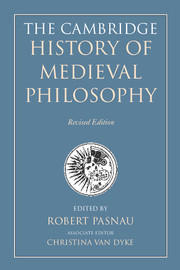Book contents
- Frontmatter
- Contents of Volume 1
- Preface
- List of contributors
- Frontmatter
- Contents of Volume 2
- Introduction
- I Fundamentals
- II Logic and language
- III Natural philosophy
- IV Soul and knowledge
- 21 Soul and body
- 22 The soul’s faculties
- 23 The nature of intellect
- 24 Perception
- 25 Mental representation
- 26 Science and certainty
- 27 Divine illumination
- 28 Skepticism
- V Will and desire
- VI Ethics
- VII Political philosophy
- VIII Metaphysics
- IX Theology
- Appendices
- Bibliography of primary sources
- Bibliography of secondary sources
- Index nominum
- Index rerum
- References
25 - Mental representation
from IV - Soul and knowledge
Published online by Cambridge University Press: 05 August 2014
- Frontmatter
- Contents of Volume 1
- Preface
- List of contributors
- Frontmatter
- Contents of Volume 2
- Introduction
- I Fundamentals
- II Logic and language
- III Natural philosophy
- IV Soul and knowledge
- 21 Soul and body
- 22 The soul’s faculties
- 23 The nature of intellect
- 24 Perception
- 25 Mental representation
- 26 Science and certainty
- 27 Divine illumination
- 28 Skepticism
- V Will and desire
- VI Ethics
- VII Political philosophy
- VIII Metaphysics
- IX Theology
- Appendices
- Bibliography of primary sources
- Bibliography of secondary sources
- Index nominum
- Index rerum
- References
Summary
Medieval philosophers routinely distinguish between what is within the mind (in anima) and what is outside the mind (extra animam). Material substances and their qualities are taken to be paradigmatic cases of the latter, while emotions, acts of will, imaginations, and intellectual processes are salient examples of the former. An important array of problems these thinkers have to face, then, arise from the need to account for the various connections that can link the two realms. The most central of these problems is that some of the intramental stuff sometimes correctly represents the extramental: many of the philosophical preoccupations of the period, as it turns out, have to do with how knowledge comes about within the mind and how it is preserved.
The ultimate stake here is the human capacity for reaching truth. Following Aristotle, truth and falsity are thought of as features of propositions; and propositions, in Aristotelian logic, are taken to be complex units. Insofar, then, as the mental realm is the primary locus for knowledge, belief, and the like, there have to be propositions in it, and those have to be composed of simpler units: “for truth and falsity” Aristotle wrote, “involve a combination of thoughts” (De anima III.8, 432a10). Those subpropositional items, capable of serving as the basic representational units for the construction of mental propositions, will be the focus of the present chapter.
- Type
- Chapter
- Information
- The Cambridge History of Medieval Philosophy , pp. 346 - 356Publisher: Cambridge University PressPrint publication year: 2014
References
- 1
- Cited by

